Section 1: The Top 5 Healthiest Types of Water For Your Home or Office
There is a lot of debate over the best type of water to drink. Personally, I think we make it more complicated than it needs to be.
Whether or not you believe drinking water should contain minerals, contain a high pH, or that we need eight glasses a day - there is one thing that most people agree on - the water we drink should not contain contaminants or pollution that can negatively impact our health.
The two main fluids of the body (blood and lymph) are mostly water, making it especially important to consume as clean of water as possible to protect the health of our trillions of cells.
Unfortunately, thousands of new chemicals are introduced into the environment and consumer products every year and it’s virtually impossible to avoid all forms of pollution.
However, we do have a choice when it comes to the purity of the water we consume - which can go a long way toward reducing our body’s toxic load.
See the end of Section 1 to learn how I purify my water.
I have listed below, what I believe to be the Top 5 Healthiest Waters that we can use and consume and why.
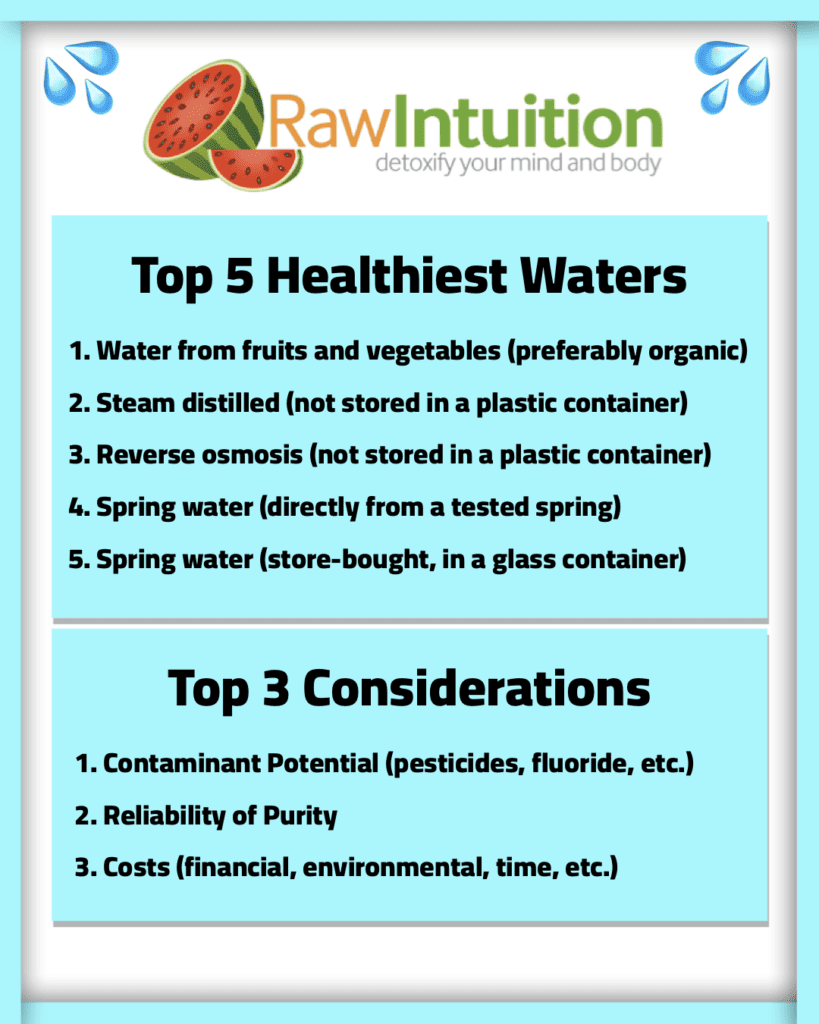
1. Water from fruits and vegetables (preferably organic)
The food you eat plays a major role in your hydration levels.
The human body is roughly 70% water. Without adequate hydration - cells, organs, and tissues cannot properly function.
Unfortunately, many people are eating foods that are severely deficient in water. Diets centered around cooked and dehydrated foods containing far less than 70% water are causing their body to have to tap into its internal water supply to digest and eliminate these foods - this quickly leads to cellular dehydration.
However, a diet centered around fresh, raw, organic fruits and vegetables - which naturally contain more than 70% water - supplies the body with the healthiest, most hydrating form of water, supporting both the digestion of these foods and maintaining the body’s hydration levels.

I believe the water in fruits and vegetables has two main benefits when it comes to hydration compared to any other form of water:
→ Firstly, this water contains organic minerals which the body utilizes very efficiently with little waste to be excreted.
Other forms of water (spring, tap, etc.) contain inorganic minerals, which the body is much less efficient at utilizing.
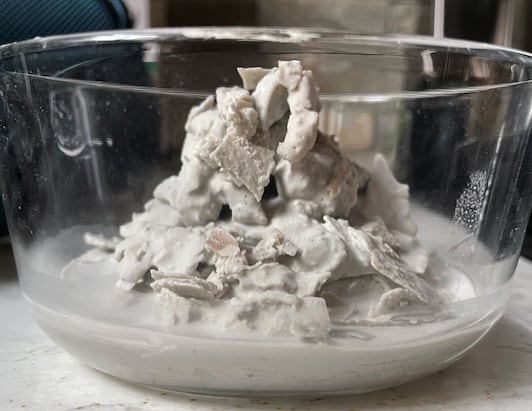
The picture above is the water distiller residue that was collected in my distiller's boiling chamber after less than two months of use. I did not have this sediment lab-tested, but it almost certainly contains various levels of inorganic minerals, pharmaceutical drugs, heavy metals, chlorine, disinfection byproducts, industrial waste, agricultural runoff, pesticides, microplastics, and more. If you're interested, you can see Pure and Secure's 3rd party lab testing here - they are located in the Midwest (Nebraska) just like me (Minnesota).
These inorganic minerals (and other contaminants) largely become obstructions that the body must allocate some of its water to assist in their elimination - thereby reducing the body’s net gain in hydration compared to water from fruits and veggies.
→ Secondly, water within fruits and vegetables contains what researcher Gerald Pollack calls Exclusion Zone (EZ) water or H3O2, which is negatively charged, gel-like water, which has an antioxidant-like effect within the body.
So, when it comes to cellular hydration, a water-rich diet should be the foundational source of a person’s hydration. What they choose to drink beyond that should ideally contain as few environmental contaminants as possible.
2. Steam distilled (not stored in a plastic container)
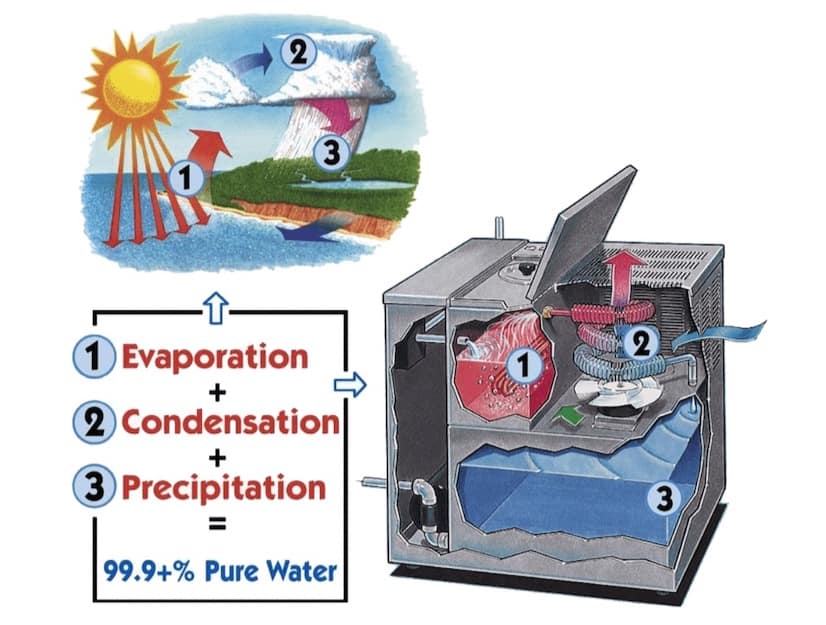
I believe the next best form of water is steam-distilled. I personally use a home water distiller to purify my water, which I will share more information about at the end of this post.
The benefit of steam-distilled water is that it is purified through a phase change (liquid to steam and back to liquid) rather than through a barrier (filters), which declines in efficiency over time. Because of this, steam distillation consistently removes up to 99.9% of contaminants, making it the most reliable way to remove impurities and contaminants from water.
Some people worry about the lack of minerals in distilled water, but this can easily be addressed. Here are a few easy ways to add organic minerals back into your steam-distilled water:
Infuse with lemon or lemon and strawberries
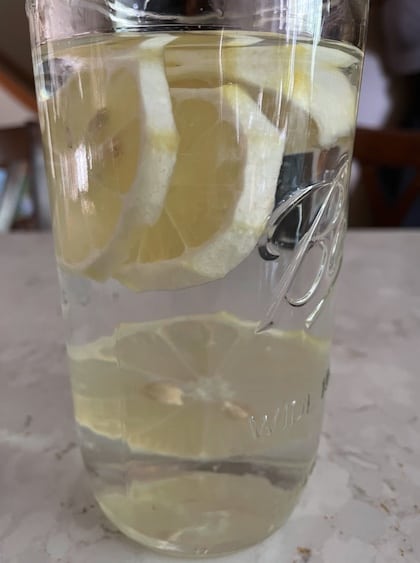
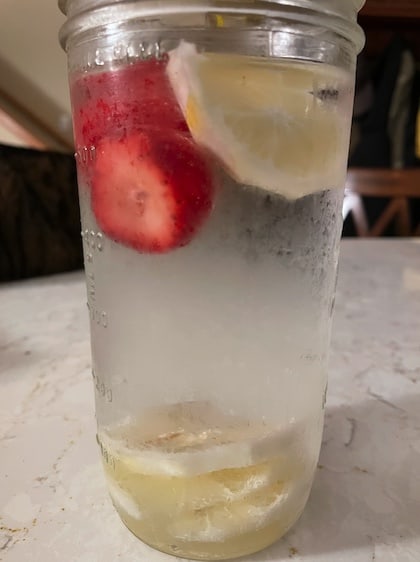
Infuse with cucumber or dried fruit (prunes, dates, etc.)
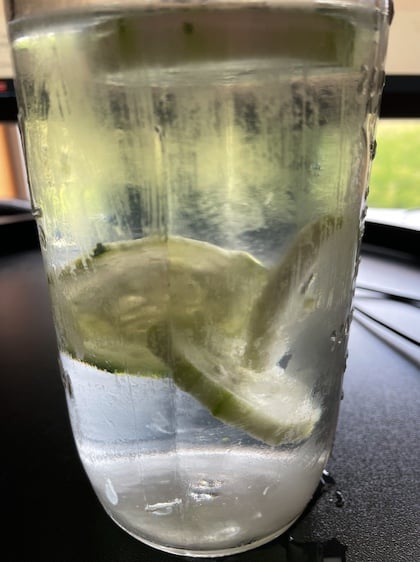
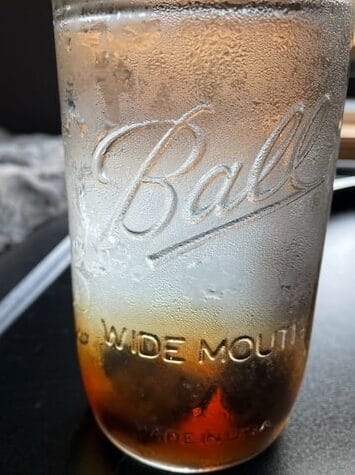
There are a number of other fruits and herbs you can use to infuse into your distilled water to increase the organic mineral content. Just soak whatever fruit or herb you want in the water for a few hours or overnight and you will have refreshing, contaminant-free water.
I believe the most important thing is to get the harmful contaminants (heavy metals, fluoride, chlorine, pharmaceutical drugs, etc.) out of the water, and from there, you can choose to make any additions you feel are necessary.
3. Reverse Osmosis (not stored in a plastic container)
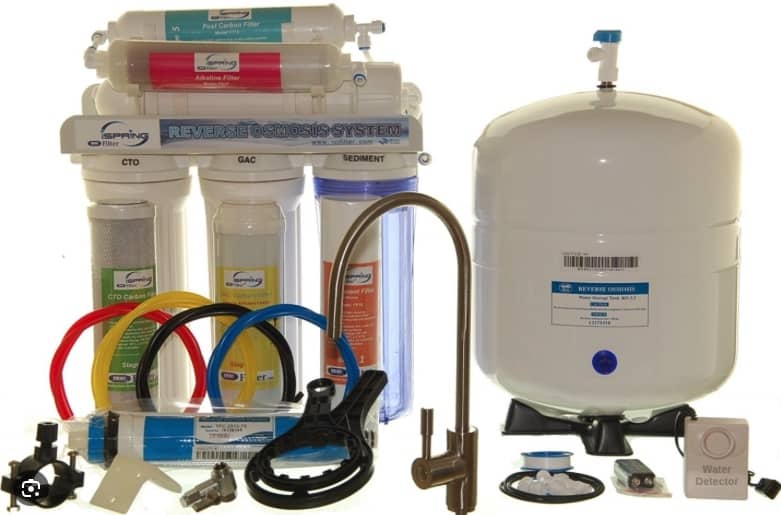
Next on my list would be reverse osmosis (RO), which is what I was drinking for many years until I learned about distilled water. RO water systems should remove the majority of contaminants, however, they won't remove them all - and their filtration efficiency largely depends on the quality and condition of the filter being used.
Some people prefer RO water because it still contains some minerals. However, remember that these are inorganic minerals and the water may also contain fluoride, nitrates, bacteria, and possibly other contaminants.
RO systems also waste a significant amount of water during the filtration process. They have gotten better in recent years, however, they are still nowhere near as efficient as distillers.
That said, high-quality RO systems can produce good-quality water that I would be comfortable drinking as a backup to distilled water if I had to.
4. Spring Water
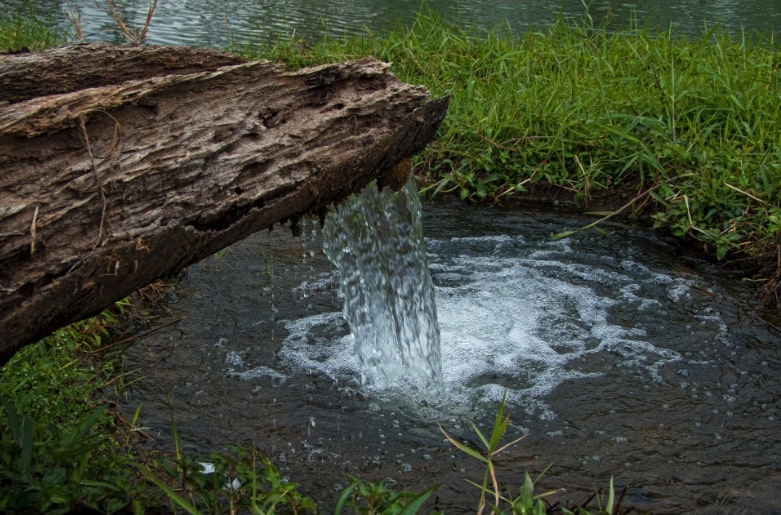
The last type of water that makes my Healthy Water List is spring water. Ideally, I believe gathering spring water directly from a spring that has been tested for contamination is the healthiest form of spring water since you know the exact source and how the water was handled and transported.
One important caveat to keep in mind about testing springs for contaminants is that the test will only show what is being tested for. With all the contamination that is in our environment these days, there are many contaminants that are not included in standard testing guidelines.
For this reason, it is important to research if there are any factories, farms, power plants, or other pollution hazards in the surrounding area - especially upstream.
In addition to doing your best to verify the water is coming from an uncontaminated spring, I would also run the water through a basic filter to remove some of the sediment that can often be in spring water.
If you don’t have access to an uncontaminated spring or the time and resources to collect your own spring water, then glass bottled spring water from a store would be my next choice.
My Top 3 Considerations
My philosophy on water and my ranking of the list above is based on three main considerations:
1. Contamination Potential and Reliability of Purity
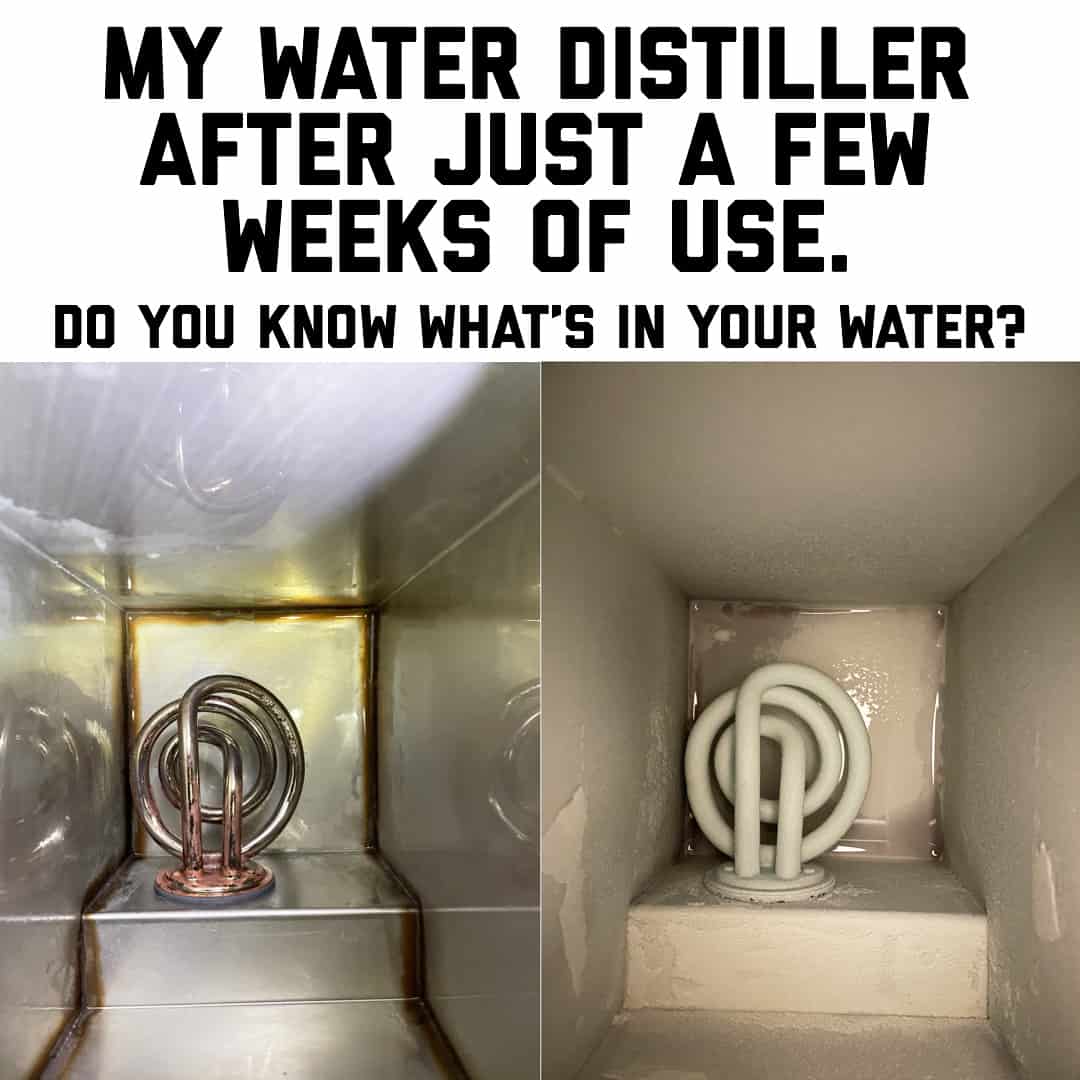
How likely are there to be harmful contaminants in the water we choose to drink?
You want to have as much confidence as possible that your water and the method of purification will provide a reliable and consistent source of uncontaminated hydration to your cells.
Distillation is the most reliable and consistent way to purify up to 99.9% of contaminants from water compared to all other methods.
RO is the second most reliable method, but they are not always consistent and they cannot remove the same range of pollutants that distillers can.
All filter systems lose efficacy the longer they are used (until the filter is replaced) so you never know how well it is filtering out everything it’s supposed to.
Filter systems, like RO, also have a tendency to build up bacteria within the filter that can contaminate the drinking water being produced.
Spring water is vulnerable to the hundreds of thousands of untested and unregulated industrial chemical pollutants that are dumped into the environment every year.
Without proper research of the surrounding area and frequent adequate testing (difficult to do) of the water, I would personally choose the other options on this list when possible.
2. Costs

The cost (and convenience) of obtaining water is also something many people consider when choosing their drinking water source.
The most time and labor would typically go into finding a spring and bringing your own containers to fill each time you needed more water. This is not feasible for most people, especially if a spring is not close to their home.
For most people, store-bought spring water would be more feasible than going to a spring, but it is often more expensive than other options and creates a lot of waste from the packaging.
For years, I would bring several glass jugs to my local supermarket once or twice a week, and fill them up at their reverse osmosis dispenser for 33 cents per gallon. This worked well for me, however, it was not convenient lugging around all of those glass jugs every time I needed water.
Home RO systems are another option, which eliminates the need to carry around glass jugs at the grocery store. RO systems vary widely in their upfront cost as well as the cost of maintenance depending on a variety of factors.
In 2023, under-sink RO systems can cost anywhere from $150-$1,300 with an average annual maintenance cost of $100-$250. These systems may also significantly increase your water bill, as it takes several gallons of raw tap water to produce one gallon of drinkable RO water.
From my research and experience, a home water distiller is the most cost-effective way to ensure you have clean water.
Like RO systems, the cost of distillers can be anywhere from $60-$3,500 or more, depending on the brand and type (countertop vs automatic model) with an average annual maintenance cost (carbon filters, vinegar for cleaning, etc.) of less than $100. The cost of electricity to run the distiller will vary depending on how much you use it, as well as the cost of electricity in your city.
The benefit of having a quality home water distiller is that it should last for several decades with minimal repairs being needed. I have owned my Pure Water Mini Classic Countertop Distiller since 2018 and in that time I have replaced one $35 part and an O-ring - both were very simple to change. This is the same model of distiller my mom has had for close to 10 years and she has spent about $50 in part-replacements during that time.
I have also owned my AquaNui 8/5 Automatic Water Distiller since 2020 and have loved the convenience of the auto-fill feature and the 5-gallon storage tank. This eliminates the need to store your distilled water in 5-gallon jugs or any other size container for that matter. Though, I do keep about ten one-gallon glass jugs stored away in addition to the 5-gallon storage tank that's built into the distiller - just in case I need it as a backup.
The automatic models do require installation to a water line and more frequent cleaning and maintenance than the countertop model but I have found it to be well worth it to have a steady flow of distilled water whenever I need it.
Check out this video I made comparing my countertop distiller versus my automatic distiller: Best Home Water Distillers Review
You get what you pay for when it comes to the cost of any water purification system.
The great thing about Pure Water Distillers and AquaNui Distillers is that they are family-owned with over 50 years in business and their water distillers are made in the USA. Their distillers are well-built and durable and should last several decades with minimal repair costs, if maintained properly.
If you ever do need to replace any of the water distiller parts, they have a catalog of parts for each distiller that you can easily order here: Parts By Distiller
I often receive messages from people who purchased the least expensive distillers available and they break down and need to be replaced within a few years.
This is why I am an affiliate of Pure Water and AquaNui water distillers. My family and I have personally used them for many years and have experienced the "distilled water difference."
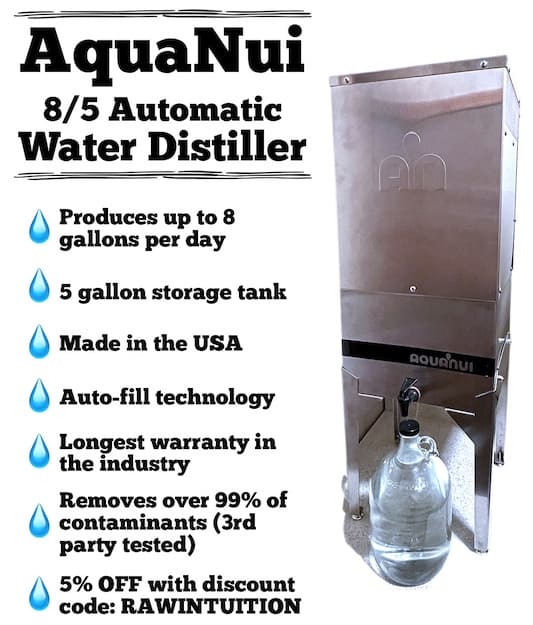
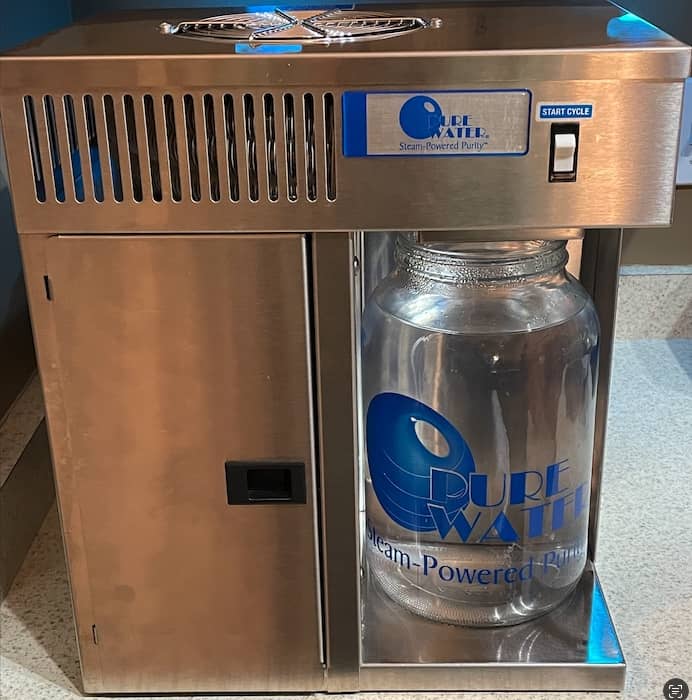
If you would like to have a Pure Water or AquaNui distiller for your home or office, you can use my discount code: RAWINTUITION when you check out to get 5% off your order for any of their distillers or products.
Do you run a business and need contaminant-free water in the production of your product?
Pure Water also has Commercial Water Distillers for dental offices, cafes, coffee shops, food processors, hospitals, laboratories, schools, daycares, printing companies, hydroponic growers, microgreen growers, health centers, and more.
If you use my code, I get a commission and you get 5% off of your order - WIN/WIN!
I hope this list has helped you in your search for clean drinking water.
Section Two: 5 Reasons To Own a Water Distiller
Not All Water Is Equal
The type of water that you consume can play a key role in determining your state of health. Many people are drinking water that contains a slew of harmful chemicals that are stealthily causing them to experience health problems.
It is becoming more well-known that tap water should be avoided, and thankfully people are searching for better options. Unfortunately, many people get sent down the wrong path by fancy marketing and end up believing they need to drink high-pH waters or some fancy-sounding, expensive brand-name water.
I was fortunate many years ago to have found the work of true health pioneers like Dr. Paul Bragg, Dr. Norman Walker, Dr. Brian Clement, Dr. Robert Morse, Dr. Allen Banik, and others who educate people about distilled water and why it is (almost) the best water - second only to the structured water contained within organic fruits and vegetables.
Besides fresh fruit and vegetable juices, I have exclusively been using distilled water for all of my drinking and food preparation needs over the last 5+ years, and my only regret is that I wish I had started sooner! Not only for the health benefits but the convenience and environmental benefits as well.
While there are many reasons that distilled water should be your first choice for drinking water as well as the water you use in cooking and recipe creations, I have narrowed down my top five reasons below:
1. Removal of inorganic minerals
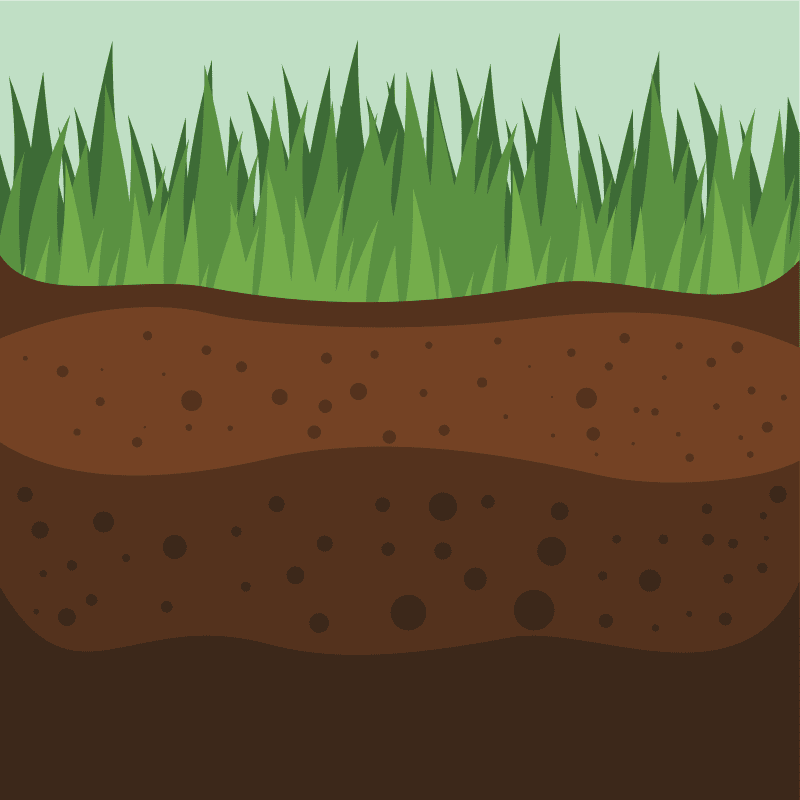
The cells of the human body do not do well with inorganic minerals - "inorganic" - meaning, those that are present in rocks and soil. This is demonstrated by the fact that we cannot obtain the nutrients we need by eating soil directly.
We must allow for the nutrients in the soil to be taken up through the root systems of plants and incorporated into the plant tissues (fruits, vegetables, leafy greens, nuts, seeds) as organic minerals. It is in this organic state that our cells can best utilize minerals.
Plants have an amazing ability to take the lifeless (inert) inorganic minerals that are difficult for our cells to work with and in a way, infuse them with life - making them exponentially more bioavailable and compatible with our body.
When we drink hard water, the minerals are mostly rejected by the cells and end up accumulating in our tissues and forming obstructions within the body. Just as you see a white residue around your sink, in your bathtub, or on your dishes - this residue can build up inside the body’s vascular system and other tissues throughout the body.
Distilled water is free of these inorganic minerals and other harmful substances and therefore is the safest water that we can consume - besides that contained within organic fruits and vegetables.
Distilled Water For Medical Purposes
Because inorganic minerals and other contaminants can build up and interfere with many medical devices, distilled water is often recommended for CPAP machines, dialysis machines, humidifiers, and more.
Best Water To Drink To Avoid Kidney Stones?
The most common form of kidney stone is calcium oxalate kidney stones. These form when oxalic acid binds with free calcium in the blood and collects in the kidneys where stones are formed. There are several factors that can contribute the kidney stone formation, but when there is too much free calcium flowing through the kidneys, especially in an inflammatory environment, there is a increased risk of forming stones.
This makes distilled water the logical choice for someone trying to reduce their risk of kidney stones, as distillation removes the inorganic calcium, therefore, less inorganic calcium would be getting absorbed into the blood.
But doesn't distilled water leach minerals from the body?
Well, that depends on which type of minerals you're talking about. The great thing about drinking distilled water is that it can help to remove the obstructive inorganic minerals from the body - however, it will NOT remove the minerals that have been utilized and incorporated into the cells and tissues. So, it is only the UNUSABLE inorganic minerals that have been rejected by the cells that get pulled out of the body when we drink distilled water - yes, please!
Can distilled water hydrate your body?
Yes, distilled water has been consumed for centuries, providing hydration to people - especially those living near or on the ocean. The US Navy has historically relied on distillers to hydrate crew members on their ships and submarines. Cruise ships use distillation as one way to provide safe drinking water to their passengers. Throughout recorded history, there are many examples of people relying on distilled water for their drinking water needs.
With that said - much of a person's hydration should come from a diet rich in fresh fruits and vegetables. The structured water in fruits and vegetables is the optimal form of water to hydrate the body. Distilled water should be used as a supplemental source of hydration, secondary to a hydrating, mineral-rich diet.
Can you do extended water fasts on distilled water?
Yes, many people (including myself) have undergone extended water fasts using nothing but distilled water. True North Health Center in Santa Rosa, California has placed thousands of people on extended water fasts for up to 40 days using distilled water.
I, myself, have done many water fasts, including one of 26 days on nothing but pure distilled water.
I believe the best results one can receive from fasting are achieved by utilizing the purest water possible - distilled water.
Extended water fasting should only be done with proper education and experienced guidance.
Is it better to drink distilled water or spring water?
Spring water comes from naturally occurring underground springs that many people (and some bottled water companies) search out to collect their own raw water.
Spring water is generally thought of as a safer alternative to tap water and in most cases, it probably is - however, it is still full of inorganic minerals (essentially tiny rocks) that the body does not utilize well.
Additionally, there is virtually no source of natural water left on Earth that has not been, to some extent, contaminated by pesticides, plastics, or industrial waste. Even rainwater picks up various toxins from air pollution before it hits the ground.
So, while spring water is most likely far better than tap water, it still contains components that I believe we should be avoiding as much as possible.
For these reasons, my water of choice (outside of what I get from fruits and vegetables) is steam-distilled water.
Remember, the difference between distilled and spring water goes beyond just the mineral content. Distilled water should have no minerals or contaminants and spring water contains inorganic minerals and likely some contaminants.
To get the best of both worlds - meaning contaminant-free water with organic minerals - simply do what I previously covered - distill out the contaminants and then soak a fruit or herb in your distilled water to infuse it with organic minerals that your body can utilize.
2. Removal of pesticides, pharmaceuticals, chlorine, and more

Billions of pounds of pesticides are used each year, and the lakes, rivers, and oceans become the collection site for all of these poisons. On top of that, tap water commonly contains various pharmaceutical drugs, industrial waste products, micro-plastics, pathogenic bacteria, heavy metals, water treatment chemicals, fluoride, and more. All of these contaminants can damage the integrity of the intestinal tract and the gut microbiome - leading to acute or chronic health problems.
Distilled water is the only method of water purification that consistently removes over 99.9% of these contaminants from the water. Filter-based systems, such as reverse osmosis, are not nearly as efficient as steam distillation, and their performance degrades over time as the filter is used.
As long as someone is providing the proper maintenance to their water distiller, the performance and reliability of the machine should remain consistent throughout the life of the machine.
Is Purified Water the Same as Distilled Water?
The term "purified water" is a broad label that can mean many different things. Simply running tap water through a carbon filter could be considered purified water because some impurities, such as chlorine, were removed. However, removing one or two contaminants from water and calling it purified water is very misleading - as there could be numerous other contaminants (ie. pharmaceutical drugs) that still remain in the water.
Distilled water is a form of purified water of which 99.99% of contaminants have been removed through the process of boiling the water and collecting the purified steam in a container. This is similar to what we see in Nature as the sun heats up surface water, causing it to evaporate and condense into clouds until it falls back to the Earth as rain. The advantage of distilled water is that it does not contain the particles of air pollution that rain water collects on its journey through the atmosphere.
So while distilled water is a form of purified water, there are many other forms of purified water that are not so pure. The most reliable way to know that you are drinking water that is free of ALL harmful contaminants, is to use a high quality water distiller that has a post-carbon filter to ensure all potential VOCs (ie. chlorine) and other contaminants have been adequately removed.
3. Eliminate the use of plastic bottles / micro-plastics / better for the environment
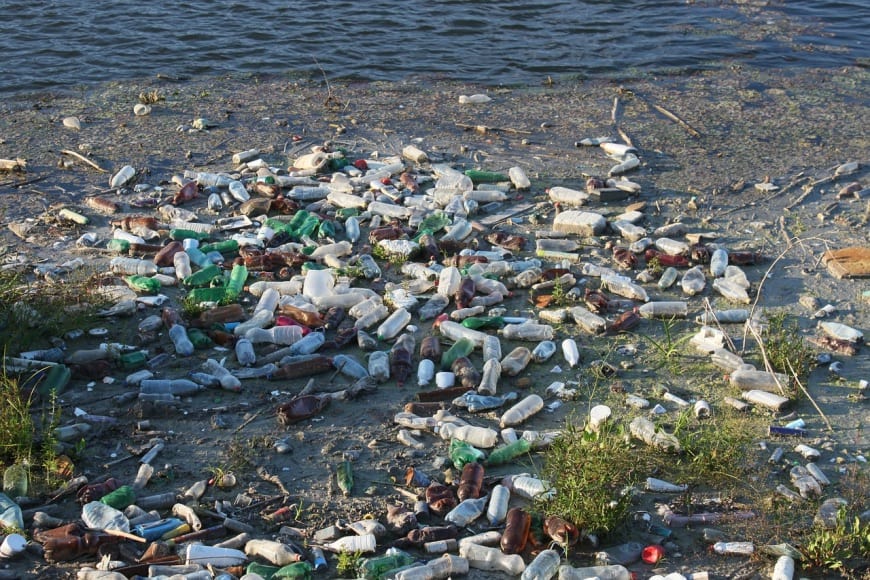
When it comes to protecting the environment, water distillation has a huge upside. It is reported that worldwide over one billion plastic bottles are used EACH DAY! Plastics are devastating our environment and wildlife - so anything we can do to reduce our consumption of plastic is a step in the right direction.
Having a home water distiller eliminates the need to purchase bottled water, meaning you are one less person adding plastic to the landfills. This also means fewer micro-plastics are being dispersed throughout the environment. As plastics break down, they release tiny particles of plastic that are being found in every region of the world - including within us.
To reduce your personal intake of micro-plastics, always store your water in glass when possible, and if you need to take your water on the go, it is best to use either glass mason jars or stainless steel containers to carry it with you.
4. Convenience and Money savings

Back when I used to buy reverse osmosis (RO) water from the store, I would carry several one-gallon glass jugs with me to fill up at their RO dispenser every three or four days. While this was an inconvenience, I was willing to do it in order to avoid using tap water or buying more plastic water bottles.
The time it required was one thing, but it also required the use of additional gasoline and more miles on my car. This can be said for people that travel to natural springs, as well.
Besides saving on time and gasoline, a home water distiller produces water much cheaper and more efficiently than using reverse osmosis systems, bottled water, or water delivery services.
The great thing about a home water distiller is that you have the cleanest water possible available to you right in your home. No more dealing with long lines at the grocery store or waiting in traffic just to obtain clean drinking water.
5. Peace of mind
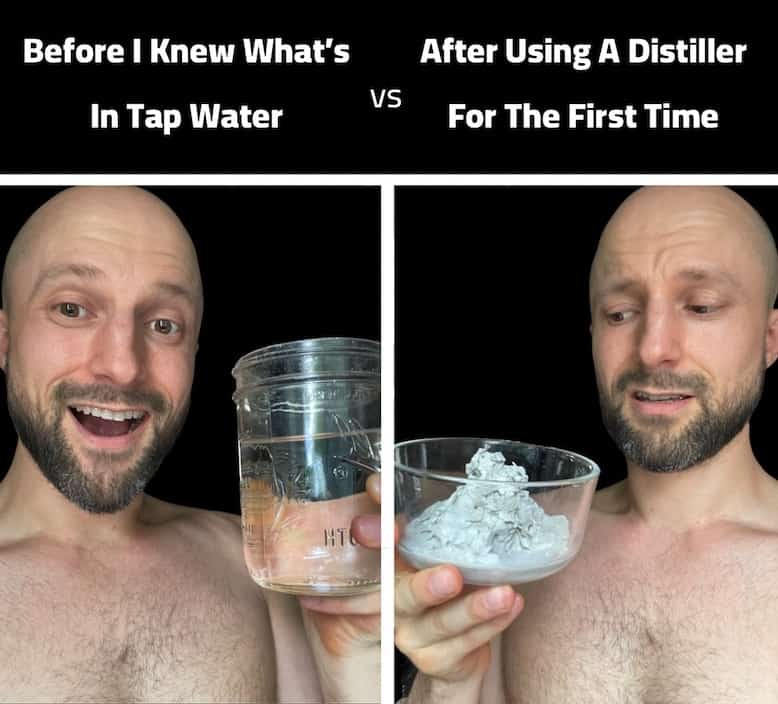
For me, one of the biggest benefits that I enjoy from having a home water distiller is the peace of mind that I am consuming the cleanest possible water - free of harmful contaminants.
I learned from experience that reverse osmosis systems are not a consistently reliable way to remove contaminants that I am trying to avoid. By using a total dissolved solids (TDS) meter to see how many dissolved solids (such as inorganic minerals) were in the reverse osmosis water that I was getting from various stores - I found that it varied greatly from as low as 3 to as high as 252 parts per million. Ideally, we want to be as close to zero TDS as possible, so seeing those high numbers was concerning to me. When I test the water from my distiller, I consistently have a TDS reading of 0.
I don’t want to have to guess or assume that I am drinking clean water free of contaminants - I want to be sure - which is why I choose to steam distill my water.
So there you have it - those are my top 5 benefits of using a home water distiller!
Lastly, in addition to using a home water distiller, I also want to encourage you to do what you can to stop supporting the companies and organizations that are polluting our water and environment in the first place. Vote with your dollars and support organic family farms, stop using synthetic pesticides and fertilizers, eat a whole food, plant-exclusive diet, and avoid using plastics as much as possible.
If you would like more information about the distillers that I use in my home, you can check them out here:

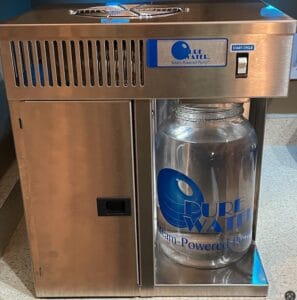
I love these distillers so much that I became an affiliate for them - and if you use my affiliate code: RAWINTUITION - I get a commission and you can get 5% off of your order - WIN/WIN!
If you have any questions, please leave them below, or email me at Matt@Myrawintuition.com and I would be happy to help!
Peace, health, and clean water,
Matt
Myrawintuition.com

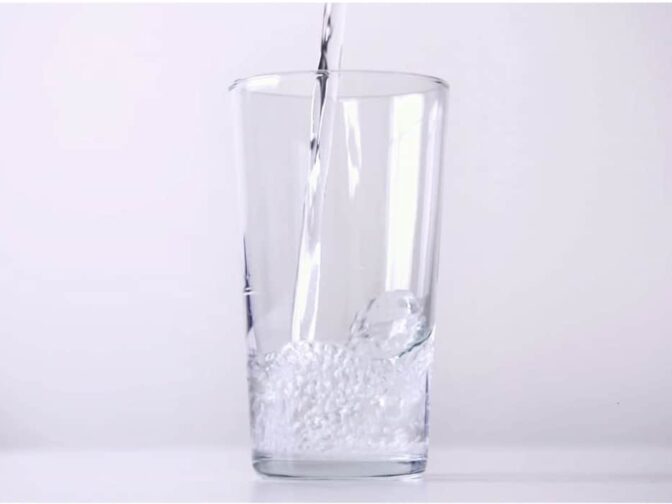
2 Replies to “The Ultimate Guide to Choosing the Best Drinking Water”
I appreciated it when you shared that there are many people who drink water that contains harmful chemicals that are stealthily causing them to experience health problems. It is best to get a clean water supply from a reputable supplier. I would like to think if a company needs to provide a clean water supply for its employees, it should consider working with a reliable water delivery service.
Agreed! Thanks for the comment, Taylor!